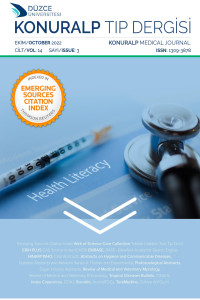Abstract
Objective: Research on simulation-based experience focuses primarily on the student's level of knowledge, skills, self-confidence, and satisfaction. There is only one scale in Turkish that can be used to measure satisfaction with the simulation experience. The aim of this study was to establish the validity and reliability of the Turkish version of the Satisfaction with Simulation Experience Scale (SSES).
Methods: The study sample consisted of 130 nursing students from two universities. Data were collected using a student information form, the Turkish version of the Satisfaction with Simulation Experience Scale (SSES-TR) and the Scale of Student Satisfaction and Confidence in Learning (SSSCL). The original SSES was translated into Turkish. Thirteen academics, who were experts in nursing and simulation, were consulted for content validity. Expert feedback was collected in a form to determine the content validity ratio using Lawshe's technique. The Turkish adaptation of the SSES was performed by four linguists to ensure linguistic validity. The correlation between the SSES-TR and SSSCL was determined using concurrent validity and Pearson’s Correlation. Internal consistency tests were used to test reliability. The SSES-TR was administered to 35 students as a test-retest with an interval of two weeks to determine its consistency across time. Construct validity was evaluated by confirmatory factor analysis (CFA).
Results: The scale had a content validity index (CVI) of 0.86. The SSES-TR had a Cronbach’s alpha (α) of 0.928. The correlation between SSES-TR items and total and subscale scores ranged from 0.492 to 0.749. Test-retest reliability coefficients showed that the SSES-TR total score and subscale scores were compatible. The fit statistics of the 3-factor scale structure according to CFA are at the level of "acceptable fit" according to RMSEA (0.095) and SRMR (0.090).
Conclusions: The SSES-TR is a reliable and valid measure that can be used to assess nursing students’ satisfaction with simulation-based experience.
References
- 9. Andrea J, Kotowski P. Using standardized patients in an undergraduate nursing health assessment class. Clin Simul Nurs 2017;13(7): 309-313. 12. Levett-Jones T, McCoy M, Lapkin S, Noble D, Hoffman K, Dempsey J, . . . Roche J. The development and psychometric testing of the Satisfaction with Simulation Experience Scale. Nurse Educ Today 2011; 31(7), 705-710.
Abstract
Amaç: Simülasyona dayalı eğitimle ilgili çalışmaların çoğu öğrencilerin bilgi ve beceri edinme, özgüven ve memnuniyet ölçüm sonuçlarına odaklanmaktadır. Simülasyon deneyiminde memnuniyeti ölçen sadece bir Türkçe ölçek vardır. Bu çalışmanın amacı “Simulasyon Deneyimi Memnuniyet Ölçeği’nin” Türkçe geçerlik güvenirliğini yapmaktır.
Gereç ve Yöntem: Çalışmanın örneklemini iki farklı üniversitenin Hemşirelik bölümünde öğrenim gören 130 öğrenci oluşturmaktadır. Veriler Öğrenci Tanıtım Formu, Simulasyon Deneyimi Memnuniyet Ölçeği (SDMÖ), Öğrenmede Öğrenci Memnuniyeti ve Özgüven Ölçeği (ÖÖMÖÖ) kullanılarak toplanmıştır. Türkçe çevirisi yapılan ölçek kapsam geçerliği için hemşirelik alanında uzman, simülasyon uygulamaları yapan 13 akademisyenin görüşüne sunuldu. Uzmanların görüşleri Lawshe Tekniği kullanılarak tek bir formda birleştirilerek kapsam geçerlilik oranı belirlendi. SDMÖ’nin dil geçerliğini sağlamak amacıyla Türkçe’ye uyarlama çalışmaları dört dil uzmanı tarafından gerçekleştirildi. ÖÖMÖÖ ile SDMÖ arasındaki ilişki eş zaman geçerliliği yöntemi uygulanarak Pearson Korelasyonu ile değerlendirildi. Ölçeğin güvenirliği iç tutarlılık testleri ile değerlendirildi. Ölçeğin zaman göre değişmezliğini incelemek için 35 öğrenciye 2 hafta ara ile SDMÖ ölçeği tekrar uygulandı. Yapı geçerliliği, doğrulayıcı faktör analizi (DFA) ile değerlendirildi.
Bulgular: SDMÖ kapsam geçerlilik indeksi (CVI) 0.86'dır. Ölçeğin Cronbach Alfa katsayısı 0.928 olarak elde edildi. SDMÖ maddeleri ile ölçek toplam puan ve ilgili alt boyut puanı arasındaki korelasyon katsayıları 0.492 ile 0.749 arasında değişmektedir. Ölçeğin test-tekrar test güvenirliği incelendiğinde, ÖÖMÖÖ toplam puanı ve alt boyutları için puanların uyumlu olduğu görülmüştür. DFA’ya göre 3 faktörlü ölçek yapısının uyum istatistikleri, RMSEA (0,095) ve SRMR'ye (0.090) göre “kabul edilebilir uyum” düzeyindedir.
Sonuç: SDMÖ hemşirelik öğrencilerinin simülasyon temelli deneyimden memnuniyetlerini değerlendirmek için kullanılabilecek güvenilir ve geçerli bir ölçüm aracıdır.
References
- 9. Andrea J, Kotowski P. Using standardized patients in an undergraduate nursing health assessment class. Clin Simul Nurs 2017;13(7): 309-313. 12. Levett-Jones T, McCoy M, Lapkin S, Noble D, Hoffman K, Dempsey J, . . . Roche J. The development and psychometric testing of the Satisfaction with Simulation Experience Scale. Nurse Educ Today 2011; 31(7), 705-710.
Details
| Primary Language | English |
|---|---|
| Subjects | Health Care Administration |
| Journal Section | Articles |
| Authors | |
| Publication Date | October 20, 2022 |
| Acceptance Date | October 3, 2022 |
| Published in Issue | Year 2022 Volume: 14 Issue: 3 |


